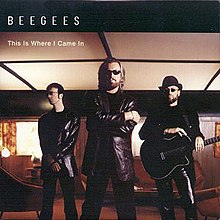
This Is Where I Came In is the twenty-second and final studio album by the Bee Gees. It was released on 2 April 2001 by Polydor in the UK and Universal in the US, less than two years before Maurice Gibb died from a cardiac arrest before surgery to repair a twisted intestine.
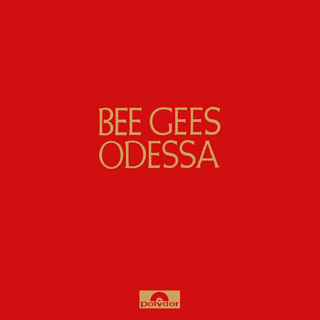
Odessa is the sixth studio album by the Bee Gees, a double vinyl LP released in February 1969, initially in an opulent red flocked cover with gold lettering. Despite reaching the UK Top Ten and the US Top 20, the album was not particularly well-received, though now is regarded by many as the most significant of the group's Sixties albums. An ambitious project, originally intended as a concept album on the loss of a fictional ship in 1899, it created tension and disagreements in the band regarding the work's direction; finally, a dispute over which song to release as a single led to Robin Gibb temporarily leaving the group.

"Night Fever" is a song written and performed by the Bee Gees. It first appeared on the soundtrack to Saturday Night Fever on RSO Records. Producer Robert Stigwood wanted to call the film Saturday Night, but singer Robin Gibb expressed hesitation at the title. Stigwood liked the title Night Fever but was wary of marketing a movie with that name. The song bounded up the Billboard charts while the Bee Gees’ two previous hits from Saturday Night Fever soundtrack were still in the top ten. The record debuted on the Billboard Hot 100 Chart at #76, then leaped up 44 positions to #32. It then moved: 32–17–8–5–2–1. It remained at #1 for eight weeks, and ultimately spent 13 weeks in the top 10. For the first five weeks that "Night Fever" was at #1, "Stayin' Alive" was at #2. Also, for one week in March, Bee Gees related songs held five of the top positions on the Hot 100 chart, and four of the top five positions, with "Night Fever" at the top of the list. The B-side of "Night Fever" was a live version of "Down the Road" taken from the Bee Gees 1977 album, Here at Last... Bee Gees... Live.

"Jive Talkin'" is a song by the Bee Gees, released as a single in May 1975 by RSO Records. This was the lead single from the album Main Course and hit number one on the Billboard Hot 100; it also reached the top-five on the UK Singles Chart in the middle of 1975. Largely recognised as the group's comeback song, it was their first US top-10 hit since "How Can You Mend a Broken Heart" (1971).
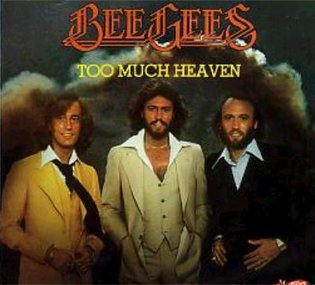
"Too Much Heaven" is a song by the Bee Gees, which was the band's contribution to the "Music for UNICEF" fund. They performed it at the Music for UNICEF Concert on 9 January 1979. The song later found its way to the group's thirteenth original album, Spirits Having Flown. It hit No. 1 in both the US and Canada. In the United States, the song was the first single out of three from the album to interrupt a song's stay at #1. "Too Much Heaven" knocked "Le Freak" off the top spot for two weeks before "Le Freak" returned to #1 again. "Too Much Heaven" also rose to the top three in the UK. In the US, it would become the fourth of six consecutive No. 1s, equalling the record set by Bing Crosby, Elvis Presley, and the Beatles for the most consecutive No. 1 songs. The six Bee Gee songs are "How Deep Is Your Love", "Stayin' Alive", "Night Fever", "Too Much Heaven", "Tragedy" and "Love You Inside Out". The songs spanned the years of 1977, 1978 and 1979.

"Tragedy" is a song released by the Bee Gees, written by Barry, Robin & Maurice Gibb, included on their 1979 album Spirits Having Flown. The single reached number one in the UK in February 1979 and repeated the feat the following month on the US Billboard Hot 100. In 1998, it was covered by British pop group Steps, whose version also reached number one in the UK.

The Marbles were an English rock duo that consisted of Graham Bonnet and Trevor Gordon, who operated between 1968 and 1969. Their only well-known singles were "Only One Woman" and "The Walls Fell Down". They also became associated with the Bee Gees members Barry, Robin and Maurice Gibb at that time.
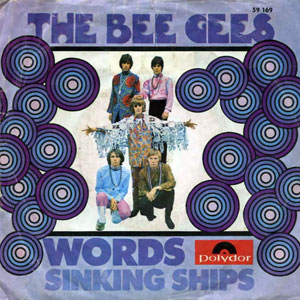
"Words" is a song by the Bee Gees, written by Barry, Robin and Maurice Gibb. The song reached No. 1 in Germany, Canada, Switzerland, and the Netherlands.

"Alone" is a song by musical group the Bee Gees. The ballad, written by Barry, Robin, and Maurice Gibb, is the opening track on their 21st studio album, Still Waters (1997), and was the first single released from the album on 17 February 1997. In the United Kingdom, the song was backed with two B-sides: "Closer Than Close" and "Rings Around the Moon", while in the United States, a live version of "Stayin' Alive" was included on the single releases.
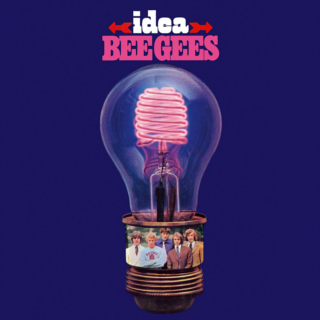
Idea is the fifth album by the Bee Gees. Released in September 1968, the album sold over a million copies worldwide. The album was issued in both mono and stereo pressings in the UK. The artwork on the Polydor release designed by Wolfgang Heilemann featured a "beehive" neon lightbulb with a group photo in its base, while the North American ATCO release designed by Klaus Voormann featured a composite head made from each band member. It was their third internationally released album – the first two albums being released only in the Australian market.
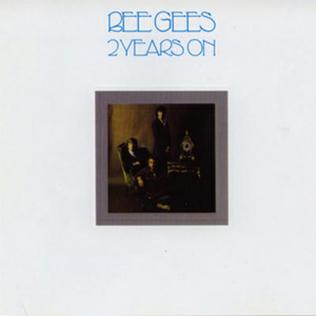
2 Years On is the eighth studio album by the Bee Gees, which reached No. 32 on the US charts. Released in 1970, the album saw the return of Robin Gibb to the group after an earlier disagreement and subsequent split following Odessa. 2 Years On was the first album with drummer Geoff Bridgford, who remained a full-time member of the group until 1972 although he was not pictured on the sleeve. The best-known track is "Lonely Days". Released as the first single by the reunited brothers, it charted high in the US, but peaked at No. 33 in the United Kingdom.
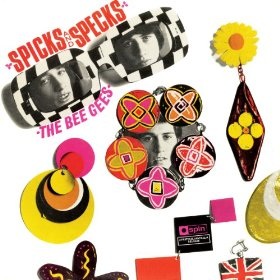
Spicks and Specks is the second studio album by the Bee Gees. It was released in November 1966, on Spin. Primarily written by Barry Gibb, the album includes the first Robin Gibb composition "I Don't Know Why I Bother With Myself" and a Maurice Gibb composition "Where Are You".

"You Win Again" is a song written by Barry, Robin and Maurice Gibb and performed by the Bee Gees. The song was produced by the brothers, Arif Mardin and Brian Tench. It was released as the first single on 7 September 1987 by Warner Records, from their seventeenth studio album E.S.P. (1987). It was also their first single released from the record label. The song marked the start of the group's comeback, becoming a No. 1 hit in many European countries, including topping the UK Singles Chart—their first to do so in over eight years—and making them the first group to score a UK No. 1 hit in each of three decades: the 1960s, 1970s, and 1980s.
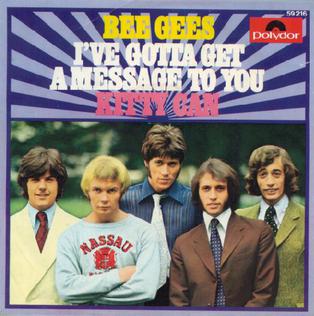
"I've Gotta Get a Message to You" is a song by the Bee Gees. Released as a single in 1968, it was their second number-one hit in the UK Singles Chart, and their first US Top 10 hit. Barry Gibb re-recorded the song with Keith Urban for his 2021 album Greenfields.

"How Deep Is Your Love" is a pop ballad written and recorded by the Bee Gees in 1977 and released as a single in September of that year. It was ultimately used as part of the soundtrack to the film Saturday Night Fever. It was a number-three hit in the United Kingdom and Australia. In the United States, it topped the Billboard Hot 100 on 25 December 1977 and stayed in the Top 10 for 17 weeks. It spent six weeks atop the US adult contemporary chart. It is listed at No. 27 on Billboard's All Time Top 100. Alongside "Stayin' Alive" and "Night Fever", it is one of the group's three tracks on the list. The song was covered by Take That for their 1996 Greatest Hits album, reaching No. 1 on the UK Singles Chart for three weeks.
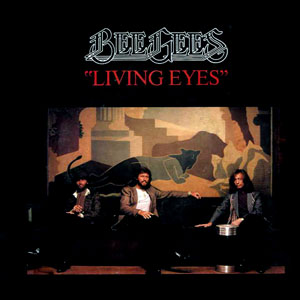
"Living Eyes" is a power ballad recorded by the Bee Gees and was released in November 1981 as the second single and title track off the LP of the same name. It was written by Barry, Robin & Maurice Gibb. The sound of this single was closer musically to the rest of the album than its predecessor, "He's a Liar".

"Ordinary Lives" is a song by the Bee Gees from their 16th studio album One, released on 27 March 1989 by Warner Records as the album's first single. It was written by the group and they produced it with Brian Tench. Following the premature death of their younger brother Andy Gibb in 1988, the Bee Gees dedicated this song and their new album to him. Originally the song was titled "Cruel World" but was later changed to "Ordinary Lives". The song reached the top 10 in Switzerland and Germany, and hitting the top 40 in some European countries except France and the UK, where it peaked at number 49 and 54 respectively.

"Paying the Price of Love" is the first single from the Bee Gees' 20th studio album, Size Isn't Everything (1993). The song was released in August 1993 by Polydor, reaching the top-10 in Belgium and Portugal, and the top-40 in Austria, Germany, the Netherlands, Switzerland, and the United Kingdom. In the United States, it charted on the Billboard Hot 100, reaching number 74, and peaked within the top-30 on the Billboard Adult Contemporary chart. The promotional video for the song, directed by Andy Delaney and Monty Whitebloom, shows the brothers performing the song as holograms on a futuristic version of MTV.

Here at Last... Bee Gees... Live is the first live album by the Bee Gees. It was recorded on December 20, 1976 at the LA Forum and was released in May 1977 by RSO Records. It reached No. 8 in the US, No. 8 in Australia, No. 1 in New Zealand, and No. 2 in Spain.

"Run to Me" is a song by the Bee Gees, the lead single from the group's album To Whom It May Concern (1972). The song reached the UK Top 10 and the US Top 20.
